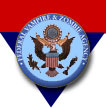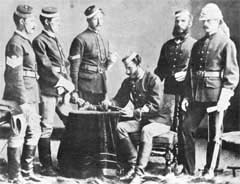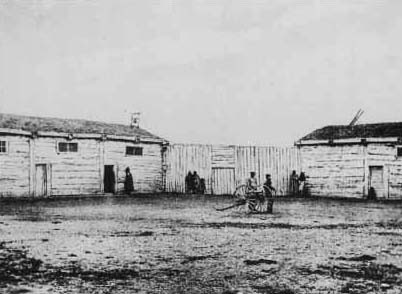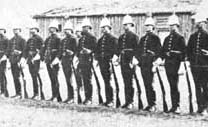

Famous Cases | Historical Tales | Vampires | Zombies
 |  |
Famous Cases | Historical Tales | Vampires | Zombies |
 |
| The North-West Mounted Police, Special Division, a.k.a. the Specials |
The opportunistic outlaws were mostly Americans who saw money to be made setting up illegal whiskey-trading camps in the region. These scofflaws would trade whiskey with Indians in return for buffalo furs and horses, and the success of their operations sometimes enabled their crude encampments to grow into rowdy towns rife with gunfights and prostitution. Vampirism inevitably took hold, driving out the transients and leaving the Indians to deal with the problem.
 |
| Inside Fort Blood |
In 1873, a freshly-minted force of 250 Canadian Mounted Police, or Mounties, traveled west with orders to destroy Fort Blood. But the Gallatin Gang received word of the impending attack and was ready when the Mounties arrived. The Gang repulsed the attack and then, as night fell, unleashed the vampires. All 250 Mounties were killed. The defeat was a stinging rebuke to the newly formed government, and proof that Canada needed a specialized force to fight vampirism in the west.
In 1874, a bill was passed creating the the North-West Mounted Police, Special Division, or the "Specials," for short. 400 men were recruited and trained in vampire combat, and in July of 1874, they left their compound at Fort Manitoba for the long trek west. With 300 horses, 73 wagons and 142 heads of cattle in tow, the Specials followed the Boundary Trail west and made camp at a bend in the Milk River not far from Fort Blood.
 |
| The Specials in control |
For the next several years, the Specials marched from outpost to outpost, slaying vampires and restoring order to the region. Trade and settlement gradually returned to normal, and relations with the Indians improved. However, the frontier nature of the west ensured that the Specials remained busy, especially during the periods from 1882 to 1885, when the railroad was under construction, and 1896 to 1899, during the Klondike Gold Rush. Like the FVZA, the Specials were often pulled away to fight wars on foreign soil, but they still managed to keep a lid on any vampire or zombie outbreaks in their homeland. In 1973, the Specials celebrated their centennial with a ceremony during which they received medals from Queen Elizabeth II. Shortly thereafter, they were disbanded.